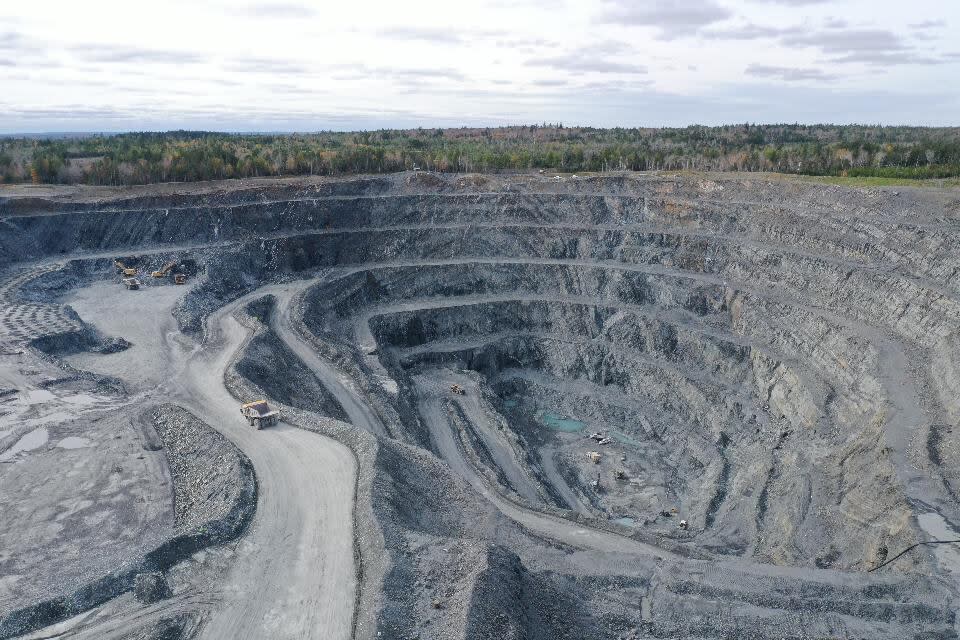From gold to green: Mining company, energy firm join forces on N.S. project

A mining company is looking into repurposing one of its shuttered gold mines in Nova Scotia to create a hydro energy storage system and solar farm.
Atlantic Mining wrapped operations at the Touquoy gold mine in Moose River last year, and announced this week it has a new idea for the site.
The subsidiary of Australia-based mining company St Barbara is teaming up with Halifax-based renewable energy firm Natural Forces for a feasibility study into what they've dubbed a "renewable energy hub."
Using the mine's open pits, it would feature what's known as a closed-loop pumped hydro energy storage system, which uses water in an elevated reservoir to act as a natural battery.
The system would include two connected water reservoirs, one higher than the other, filled by naturally accumulating rainfall.
When demand on the power grid is low, the system would take power from the grid to pump water to the upper reservoir. When energy demand is high, water from the upper reservoir would flow through a turbine back into the lower reservoir to generate electricity and feed the grid.

The system acts like a natural battery, storing energy at times when it's abundant on the grid, and feeding it back when it's in demand. (CNW Group/St Barbara - Atlantic Mining Nova Scotia)
"It just seems like a really excellent way to repurpose an existing pit," Amy Pellerin, director of Canadian development at Natural Forces, said in an interview.
"They've already created the elevation difference and they've already created a reservoir."
Pellerin said the feasibility study will also explore building a solar energy project, which would connect to the provincial grid, on the mine's waste rock pile.
A spokesperson for St Barbara said the mine's tailings facility would be topped off and remain separate from the hydro system.
Land reclamation
Andrew Strelein, managing director and CEO of Atlantic Mining, said in a news release that this approach is part of the company's commitment to sustainable development.
"Since closing Touquoy, we have been looking at potential alternative land uses as we move into mine reclamation phase," he said in the release.
Approval from the provincial government for the Touquoy gold mine included a requirement for Atlantic Mining to carry out reclamation after closing.
Pellerin said reclamation of the site will be considered in the feasibility study.
A spokesperson for the provincial Department of Environment and Climate Change said Atlantic Mining has not yet approached the department about the project, and it would need more information from the company before assessing what new environmental approvals might be needed.
'Tarnished track record'
Environmentalist Karen McKendry said innovation around greening the electric grid is a good thing, but she's wary about this idea because of Atlantic Mining's "tarnished track record so far in Nova Scotia."

The tailings management facility at the Touquoy mine in Moose River, N.S. (Steve Lawrence/CBC)
McKendry, who is the senior wilderness outreach co-ordinator for the Ecology Action Centre in Halifax, pointed to charges levied against Atlantic Mining for breaches of environmental laws.
The company was fined $10,000 and ordered to pay an additional $240,000 in financial penalties after pleading guilty to federal and provincial environmental charges relating to its gold mining operations on Nova Scotia's Eastern Shore.
"Compared to some other companies in Nova Scotia, they haven't been the best stewards of the environment," McKendry said.
She said she wants to see more details about how exactly this project would fit into the reclamation of the Touquoy mine.
Change of plans for Fifteen Mile Stream project
At one point, Atlantic Mining had planned to use the Touquoy site for processing gold from another proposed mine, the Fifteen Mile Stream project. But a spokesperson for the company said that's changed, with a new plan to keep all operations at the Fifteen Mile Stream site.
The company plans to file a new application for environmental assessment for that project by year's end.
The feasibility study on repurposing Touquoy is also expected the end of this year.
MORE TOP STORIES


